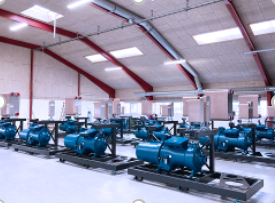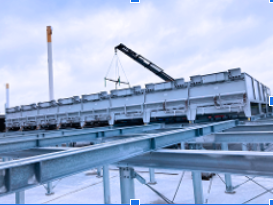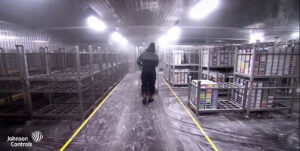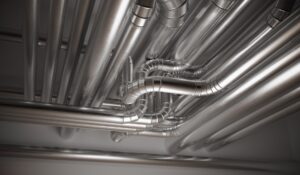Frascold, Solid Energy in district energy initiative
MILAN, Italy, 19 April 2022: District heating systems could be a key technology in achieving the international climate mitigation goals, both those laid out in the Paris Agreement and the more stringent ones set by the European Green Deal. Saying so, Frascold, which manufactures semi-hermetic compressors for the industrial refrigeration and air conditioning sectors, said it has combined with Solid Energy, which specialises in heat pumps powered by renewable energy sources, to contribute to the diffusion of district heating and pave the way to an ecological transition by signing up to numerous projects in Denmark.
 Amongst the most recent partnerships, upgrading the Galten plant in the Scandinavian country stands out, Frascold said. The plant has been in operation since 1964 and is capable of powering approximately 2,130 homes, Frascold highlighted.
Amongst the most recent partnerships, upgrading the Galten plant in the Scandinavian country stands out, Frascold said. The plant has been in operation since 1964 and is capable of powering approximately 2,130 homes, Frascold highlighted.
The collaboration between Frascold and Solid Energy for the Galten facility began in 2019 with the creation of a system able to produce 45,000 MWh per year, obtained from 6 Frascold CXH screw compressors, suitable for use with HC, for 3.5 MW of overall power. The subsequent expansion, in 2021, saw the addition of 12 CXH compressors for an increase in power of 7 MW, Frascold said.
The installed air-water heat pumps absorb heat from the outside air with 34 air coolers for a total of 3,215,000 m3/h and cover 98% of the district heating system’s power consumption – that is, 44.343 MWh – with a SCOP (Seasonal Coefficient of Performance) of 3.11, Frascold said. The plant provides a discharge temperature of 70 degrees C with a return of 38 degrees C, thus achieving a COP of 3.4 calculated by considering an outside air temperature of 8 degrees C, which is the annual average in Denmark, Frascold said.
“We think HC heat pumps are ideal for helping reduce the comfort sector’s environmental impact,” said Karsten Pedersen, Technical Director, Solid Energy. “Cascade systems with R290 and R600a guarantee the best balance of lowering direct and indirect consumption, flexibility of use and costs.
So, for this project, we relied, once more, on Frascold, which has supported us throughout each phase, and thanks to the constant dialogue with the Competence Center team, we have designed the ideal system to respond to the three challenges: Sustainability, performance and efficiency.
The partnership with Frascold is also based on the certified reliability of its wide range of hydrocarbon solutions: It is, in fact, the only manufacturer on the market with compressor sizes around 1,000 m3/h, which are perfect for our project and comply with ATEX directives for use in zone 2.”
 Fabrizio Diotallevi, Frascold Sales Area Manager, North Europe, said: “Denmark is one of the most advanced countries in terms of district heating, and approximately 1.7 million homes, or 64% of the total, are powered by these systems, of which 61% already use energy from renewable sources.
Fabrizio Diotallevi, Frascold Sales Area Manager, North Europe, said: “Denmark is one of the most advanced countries in terms of district heating, and approximately 1.7 million homes, or 64% of the total, are powered by these systems, of which 61% already use energy from renewable sources.
A continuous improvement process is in line with the objective to completely eliminate fossil fuels in the segment by 2030. With the numerous plants brought online with Solid Energy, we are proud to contribute to this ambitious project, which we hope will be replicated in other countries.
This new success story with Solid Energy is another example of our expertise in building heat pump compressors, which we have gained through years of international partnerships using this technology that, in the near future, will be the basis for virtuous heating and zero environmental impact.”
Frascold SpA – www.frascold.it/en
Frascold is a leading player in the development, production and marketing of semi-hermetic, piston and screw compressors, at the service of the refrigeration and air conditioning industry. A company in continuous evolution, with its gaze always directed toward the future, which has built, over time, its competitive positioning on the value of the dynamic efficiency paradigm in which the company becomes the very engine of change, playing a propositional and proactive role towards the demand.
With headquarters in the province of Milan, in a facility occupying 53,000 m2 in total. Frascold Spa closed 2020 with a consolidated turnover of 55 million Euro. The Company boasts a well-balanced competitive position, thanks to the complete control of the value chain and a careful internationalisation strategy, which is expressed in significant investments in direct bases in China, India and the USA and agreements with Distributors in 86 countries.
Solid Energy A/S https://www.solid-group.dk/en
Solid Energy A/S is a cleantech company founded in 2015 in Denmark. It specialises in designing and installing heat pumps for district heating power stations and for large plants in, for example, the industrial sector. Solid Group has 35 employees and implemented 13 turnkey projects, for an overall total power of 40 MW.
Frascold, Solid Energy in district energy initiative
MILAN, Italy, 19 April 2022: District heating systems could be a key technology in achieving the
international climate mitigation goals, both those laid out in the Paris Agreement and the more
stringent ones set by the European Green Deal. Saying so, Frascold, which manufactures semi-
hermetic compressors for the industrial refrigeration and air conditioning sectors, said it has
combined with Solid Energy, which specialises in heat pumps powered by renewable energy
sources, to contribute to the diffusion of district heating and pave the way to an ecological
transition by signing up to numerous projects in Denmark.
Amongst the most recent partnerships, upgrading the Galten plant in the Scandinavian country
stands out, Frascold said. The plant has been in operation since 1964 and is capable of
powering approximately 2,130 homes, Frascold highlighted. The collaboration between
Frascold and Solid Energy for the Galten facility began in 2019 with the creation of a system
able to produce 45,000 MWh per year, obtained from 6 Frascold CXH screw compressors,
suitable for use with HC, for 3.5 MW of overall power. The subsequent expansion, in 2021, saw
the addition of 12 CXH compressors for an increase in power of 7 MW, Frascold said. The
installed air-water heat pumps absorb heat from the outside air with 34 air coolers for a total of
3,215,000 m 3 /h and cover 98% of the district heating system’s power consumption – that is,
44.343 MWh – with a SCOP (Seasonal Coefficient of Performance) of 3.11, Frascold said. The
plant provides a discharge temperature of 70 degrees C with a return of 38 degrees C, thus
achieving a COP of 3.4 calculated by considering an outside air temperature of 8 degrees C,
which is the annual average in Denmark, Frascold said.
“We think HC heat pumps are ideal for helping reduce the comfort sector’s environmental
impact,” said Karsten Pedersen, Technical Director, Solid Energy. “Cascade systems with R290
and R600a guarantee the best balance of lowering direct and indirect consumption, flexibility of
use and costs. So, for this project, we relied, once more, on Frascold, which has supported us
throughout each phase, and thanks to the constant dialogue with the Competence Center
team, we have designed the ideal system to respond to the three challenges: Sustainability,
performance and efficiency. The partnership with Frascold is also based on the certified
reliability of its wide range of hydrocarbon solutions: It is, in fact, the only manufacturer on the
market with compressor sizes around 1,000 m 3 /h, which are perfect for our project and comply
with ATEX directives for use in zone 2.”
Fabrizio Diotallevi, Frascold Sales Area Manager, North Europe, said: “Denmark is one of the
most advanced countries in terms of district heating, and approximately 1.7 million homes, or
64% of the total, are powered by these systems, of which 61% already use energy from
renewable sources. A continuous improvement process is in line with the objective to
completely eliminate fossil fuels in the segment by 2030. With the numerous plants brought
online with Solid Energy, we are proud to contribute to this ambitious project, which we hope
will be replicated in other countries. This new success story with Solid Energy is another
example of our expertise in building heat pump compressors, which we have gained through
years of international partnerships using this technology that, in the near future, will be the
basis for virtuous heating and zero environmental impact.”
JCI named to FT European Climate Leaders list
CORK, Ireland, 18 May 2021: Johnson Controls (JCI) said it has been named to the inaugural FT Climate Leaders in Europe list.
Europe’s Climate Leaders 2021 is a list of companies across Europe that have shown the highest reduction of their emission intensity – that is, core greenhouse gas emissions in relation to revenues, between 2014 and 2019. Johnson Controls reported that it was one of only 300 companies selected from 4,000 across Europe.
“We are extremely proud to be recognized by the Financial Times as a European climate leader,” said George Oliver, chairman and CEO, Johnson Controls. “Sustainability has long been at the heart of everything we do, and it is an honor to be included on this prestigious list. With COP26 approaching at this critical moment in the battle against climate change, it is important that companies continue to play their part in cutting emissions and delivering clean, sustainable solutions across the entire value chain.”
According to JCI, companies on the list – compiled by research firm, Statista – were invited to submit emissions reported following the emission categories of the greenhouse gas protocol (scope 1, 2 and 3). In addition, Statista scrutinized publicly available data, mainly from financial and non-financial reports as well as from CDP (formerly the “Carbon Disclosure Project”).
Although JCI reports all three emissions scopes, the ranking only considers scope 1 and scope 2 emissions, since not all companies publish their scope 3 emissions, it said. Since 2002, JCI said, it has reduced its emissions intensity by more than 70% – equivalent to the carbon sequestered by 17,000 acres of forest. The company said it has also helped its customers save more than 30.6 million tonnes of CO2 globally and $6.6 million through guaranteed operational savings.
At the European level, JCI said, it has been effectively supporting the EU’s ambition to become carbon neutral by 2050. The European Commission recently committed to at least 55% cuts in greenhouse gas emissions (from 1990 levels) by 2030 under the European Green Deal. Decarbonizing Europe’s building stock through the European Commission’s Energy Performance of Buildings Directive has a crucial role to play in this effort – 40% of greenhouse gases come from buildings, the company said.
According to JCI, digitalization has been recognized as a key enabler for the building renovation wave in Europe and the rest of the world. Already, JCI said, it has been deploying its OpenBlue digital platform for optimizing buildings sustainability across its entire value chain – drastically improving the company’s own environmental impact and helping customers consume less energy, conserve resources and identify pathways to achieving healthy, net zero carbon communities.
Katie McGinty, Vice President & Chief Sustainability, Government and Regulatory Affairs Officers, JCI, said: “We are making positive change within our own corporation and believe we are uniquely positioned to help customers and suppliers achieve their sustainability goals. By driving global change, we are ultimately creating an environment for healthy people, healthy places and a healthy planet.”
JCI said it is also helping meet the growing demand for energy-efficient technologies. It said it has provided heat pump solutions for customers at more than a dozen district heating and cooling applications in Denmark, Finland, France, Germany, Italy and Norway.
Heat pumps, it said, have an important role to play in decarbonizing buildings and industry. They have long been in the DNA of industrial refrigeration – utilised in food and beverage, dairy and other process industries for reclaiming low-temperature waste heat and turning it into low-cost, high-temperature heat.
ASHRAE announces call for abstracts for Winter Conference
ATLANTA, Georgia, 26 March 2021: Abstracts are now being accepted for the 2022 ASHRAE Winter Conference, to be held from January 29 to February 2, 2022 at Caesar’s Palace in Las Vegas, Nevada, ASHRAE said through a Press release.
With an eye on future resources, the conference seeks to present papers and programs that cover sustainable use of energy and water, reduction of waste and improved Indoor Environmental Quality (IEQ), while addressing other challenges and opportunities in facilities, applications and processes, ASHRAE said.
“It is estimated that the world population will grow from eight billion now to around nine billion in 2050; global GDP is expected to stabilize at +2%/year,” said Raul Simonetti, Chair, 2022 Conference. “This will increase the need for food, energy and other resources to support a growing population in the coming future. The 2022 Virtual Winter Conference will provide an opportunity to examine holistically – that is, at 360° – what we do and the way we do it in order to minimize the impact on our planet.”
According to ASHRAE, the following tracks are developed to support the conference theme, ‘Holism and Perspectives towards Decarbonization’…
- Buildings use a large share of a country’s final energy, particularly for heating, cooling and various services. Papers in the “Buildings at 360°” track will focus on explaining methods, equipment, systems and solutions to satisfy occupants’ needs, to guarantee buildings’ performances and resilience, and to save resources like energy and water.
- Energy is omnipresent in our daily lives in ways like electricity for appliances or heat and cooling for industrial processes. The integration of various energy sources, processes and transportation allows us to better exploit the available energy and reduce waste. The “Energy System Integration” track will explore renewables, fossil fuels, grid integration, aggregation, demand-side flexibility, smart devices, IoT, synthetic hydrogen and synthetic fuels, CCUS and electrification.
- Indoor environment is essential for our well-being and productivity, but is often regulated differently in various parts of the world due to local conditions, circumstances, history and traditions. Papers that explain local norms and trends with an eye on energy usage would fit in the “Environmental Health and IEQ in the International Arena” track.
- The “HVAC for Industrial and Commercial Purposes” track will focus on papers that examine the challenges and opportunities in improving energy efficiency of commercial and industrial facilities and transferring lessons learned to other types of facilities.
- Refrigerants play an important role in maximizing performances and minimizing direct and indirect GHG emissions. The “Refrigerants, Safety and Performance” track will focus on papers that present advancements and developments about flammability of refrigerants that can reduce the direct emissions, but that may have safety, regulatory and performance issues when deployed on the field.
- The “Refrigerants and Refrigeration” track will explore refrigeration systems, which generate and use cold for a range of processes, from food preparation and conservation to vaccine preservation, and from long-term protection of fragile ancient inks of historical documents to others.
- The “HVAC&R Systems and Equipment” track will focus on the development of new systems and equipment, improvements to existing systems and equipment and the proper application and operation of systems and equipment.
- The “Fundamentals and Applications” track will provide opportunities for papers of varying levels across a large topic base. Concepts, design elements and shared experiences for theoretical and applied concepts of HVAC&R design are included.
According to ASHRAE, Abstracts (400 words or less) are due April 5, 2021. If accepted, final conference papers (eight pages, maximum) are due July 12, 2021.
In addition, technical papers (complete 30-page maximum papers) are also due March 29, 2021, ASHRAE said, adding that accepted conference papers and technical papers are published in ASHRAE Transactions, cited in abstracting indexes and considered for Science and Technology for the Built Environment, ASHRAE’s research journal.
For more information on the call for papers and the 2022 ASHRAE Winter Conference, ASHRAE urged those interested to visit https://ashrae.org/2022Winter.
In conjunction with the ASHRAE Winter Conference is the 2022 AHR Expo, to be held from January 31 to February 2, 2022, at the Las Vegas Convention Center. For more information on the 2022 AHR Expo, ASHRAE urged those interested to visit https://www.ahrexpo.com/.
Al Salem Johnson Controls offers support to cold stores in Saudi Arabia for holding COVID-19 vaccines

JEDDAH, Kingdom of Saudi Arabia, 03 January 2021: Al Salem Johnson Controls said it is offering its expertise to support the health sector and pharmaceutical companies in equipping industrial cold stores with the latest technologies, through systems that ensure temperatures set by each COVID-19 vaccine manufacturer.
The company made the announcement against the backdrop of countries the world over, including Saudi Arabia, rolling out vaccination drives, and health and logistics sectors and pharmaceutical companies the world over preparing their cold storage solutions across the chain to ensure safe and efficient transportation and storage of the COVID-19 vaccines at very low temperatures, ranging between -20 and -70 degrees Celsius.
 Al Salem Johnson Controls quoted one of the vaccine manufacturers, Moderna as stressing that its vaccine must be kept at a freezing temperature of -20 degrees Celsius for long-term storage (up to six months); the vaccine can be stored for 30 days at a temperature ranging between 2 and 8 degrees Celsius. The company quoted Pfizer as saying that its BioNTech vaccine requires to be stored at -70 degrees Celsius. Meanwhile, the preservation and storage temperature of the Russian vaccine, Sputnik V, ranges between 2 and 8 degrees Celsius, the company said.
Al Salem Johnson Controls quoted one of the vaccine manufacturers, Moderna as stressing that its vaccine must be kept at a freezing temperature of -20 degrees Celsius for long-term storage (up to six months); the vaccine can be stored for 30 days at a temperature ranging between 2 and 8 degrees Celsius. The company quoted Pfizer as saying that its BioNTech vaccine requires to be stored at -70 degrees Celsius. Meanwhile, the preservation and storage temperature of the Russian vaccine, Sputnik V, ranges between 2 and 8 degrees Celsius, the company said.
It said that it has a track record of providing integrated solutions in HVACR, fire, safety & security systems and building management systems in Saudi Arabia, Egypt, Lebanon and Yemen, and that it has extensive experience in the field of industrial refrigeration and the implementation of cold store projects, as well as in customising and engineering refrigeration solutions to suit the requirements of each project, depending on the nature and needs of the materials being stored.
 The company said it has vast experience in the customisation, design and development of industrial refrigeration projects, and has implemented a number of large projects in several cities across the Kingdom, in various sectors, including logistics centres, refrigeration warehouses, meat and poultry factories, storage facilities for fruits & vegetables, processed food factories, water and beverages factories, and medicine and dairy plants.
The company said it has vast experience in the customisation, design and development of industrial refrigeration projects, and has implemented a number of large projects in several cities across the Kingdom, in various sectors, including logistics centres, refrigeration warehouses, meat and poultry factories, storage facilities for fruits & vegetables, processed food factories, water and beverages factories, and medicine and dairy plants.
It said that among the key industrial refrigeration projects and cold stores it has implemented are Shahini Holding Group in Riyadh, Transmed Distribution Company, Naqel Express, Al Rabie Saudi Foods Company, and three dairy and ice cream factories of the Saudi Dairy and Food Company (SADAFCO).
 Industrial refrigeration, the company noted, is not a standard system that can be used for all projects; it requires a thorough study of the project’s facilities, utilisations and nature of work. In manufacturing facilities. It is crucial to determine if the system will be used to cool the facility, the production lines or both, the company said. Therefore, as a first step, its industrial refrigeration engineers visit and study the site from all aspects, then design and develop a system according to its cooling requirements, it added.
Industrial refrigeration, the company noted, is not a standard system that can be used for all projects; it requires a thorough study of the project’s facilities, utilisations and nature of work. In manufacturing facilities. It is crucial to determine if the system will be used to cool the facility, the production lines or both, the company said. Therefore, as a first step, its industrial refrigeration engineers visit and study the site from all aspects, then design and develop a system according to its cooling requirements, it added.
 Al Salem Johnson Controls stated that its 29 years partnership as a JV with Johnson Controls International enables it to provide its customers with the latest technologies and to transfer the global expertise available to the Kingdom. Recently, Johnson Controls International was part of a team designing, developing and implementing a cold store at the Danish Odense University Hospital, by merging two industrial refrigeration systems that use ammonia and methane, to reach the required cooling of the cold store, spreading across an area of 352 square metres, Al Salem Johnson Controls said. The system, it said, can reach a temperature of -80 degrees Celsius, which is close to the temperature needed to preserve and store COVID-19 vaccines. The system, it added, uses SABROE Chillers, which offers industrial refrigeration solutions, under the umbrella of Johnson Controls International.
Al Salem Johnson Controls stated that its 29 years partnership as a JV with Johnson Controls International enables it to provide its customers with the latest technologies and to transfer the global expertise available to the Kingdom. Recently, Johnson Controls International was part of a team designing, developing and implementing a cold store at the Danish Odense University Hospital, by merging two industrial refrigeration systems that use ammonia and methane, to reach the required cooling of the cold store, spreading across an area of 352 square metres, Al Salem Johnson Controls said. The system, it said, can reach a temperature of -80 degrees Celsius, which is close to the temperature needed to preserve and store COVID-19 vaccines. The system, it added, uses SABROE Chillers, which offers industrial refrigeration solutions, under the umbrella of Johnson Controls International.


